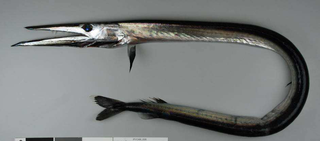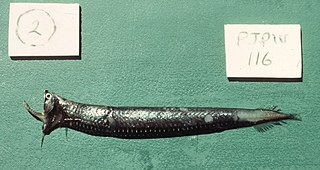| Macroparalepis | |
|---|---|
| Scientific classification | |
| Domain: | Eukaryota |
| Kingdom: | Animalia |
| Phylum: | Chordata |
| Class: | Actinopterygii |
| Order: | Aulopiformes |
| Family: | Paralepididae |
| Genus: | Macroparalepis E. M. Burton, 1934 |
Macroparalepis is a genus of barracudinas.
| Macroparalepis | |
|---|---|
| Scientific classification | |
| Domain: | Eukaryota |
| Kingdom: | Animalia |
| Phylum: | Chordata |
| Class: | Actinopterygii |
| Order: | Aulopiformes |
| Family: | Paralepididae |
| Genus: | Macroparalepis E. M. Burton, 1934 |
Macroparalepis is a genus of barracudinas.
There are currently six recognized species in this genus: [1]

Barracudinas are any member of the marine mesopelagic fish family Paralepididae: 50 or so extant species are found almost worldwide in deep waters. Several genera are known only from fossils dating back to the Ypresian epoch.

Fangtooths are beryciform fish of the family Anoplogastridae that live in the deep sea. The name is from the Greek anoplo, meaning "unarmed", and γαστήρ, meaning "stomach". With a worldwide distribution in tropical and cold-temperate waters, the family contains only two very similar species in one genus, with no known close relatives.

Ege University or Aegean University is a public research university in Bornova, İzmir. It was founded in 1955 with the faculties of Medicine and Agriculture. It is the first university to start courses in İzmir and the 4th oldest university in Turkey.

The daggertooths are a genus of marine mesopelagic fish in the order Aulopiformes, the sole genus of the family Anotopteridae. They are found in oceans worldwide, but prefer cooler waters.
Lestidiops is a genus of barracudinas.
Paralepis is a genus of barracudinas.

Stomias is a genus of barbeled dragonfishes. They live in the mesopelagic zone of all oceans and show diel vertical migration and sexual dimorphism (males are smaller, have larger eyes and larger postorbital photophores than females.
Arctozenus risso, the Spotted barracudina or Ribbon barracudina, is a species of barracudina found in oceans worldwide in the meso- and bathypelagic zone down to abound 2,200 metres (7,200 ft). This species grows to a length of 30 centimetres (12 in) SL. This species is the only known member of its genus. It is an important forage species for many pelagic predators, such as cephalopods, common dolphins, and albacore.
Dolichosudis fuliginosa is a species of barracudina found in the Atlantic Ocean and Western Pacific Ocean at a depths of around 1,200 metres (3,900 ft). This species grows to a length of 24.4 centimetres (9.6 in) SL. This species is the only known member of its genus.

Lestidium is a genus of barracudina. They are sometimes referred to as pike smelt.

Lestrolepis is a genus of barracudina.
Magnisudis is a genus of barracudinas.
Notolepis is a genus of barracudinas.

Stemonosudis is a genus of barracudinas. These are deep water fish that resemble but are not related to barracuda. They are long and slender with pointed snouts. They are hunters with large eyes and sharp teeth. Unlike barracuda, these fish have no swim bladder.
Sudis is a genus of barracudinas, with two currently recognized species:
Uncisudis is a genus of barracudinas.
Macroparalepis affinis is a species of fish which belongs to the Paralepididae (barracudinas) family. The scientific name of this species was first published in 1933 by Ege

Stemonosudis macrura is a species of deep-water marine, bathypelagic fish living at the depth range 18 to 330 m, member of the barracudina family Paralepididae. The fish is known to distributed in Indo-Pacific and eastern Pacific Ocean from around Point Conception State Marine Reserve in California in the north to Chile in the south.
The sharpchin barracudina is a species of fish in the family Paralepididae (barracudinas).
Lestidium australis is a species of fish. It is found in Eastern Australia.